Sustainable Tourism Development
VerifiedAdded on 2020/12/30
|14
|3595
|446
Report
AI Summary
This report examines the concept of sustainable tourism development, focusing on the case of France. It analyzes key stakeholders, the planning process, and the impact of tourism on the environment and society. The report also analyzes factors that hinder sustainable tourism development and provides recommendations for future development.
Contribute Materials
Your contribution can guide someone’s learning journey. Share your
documents today.
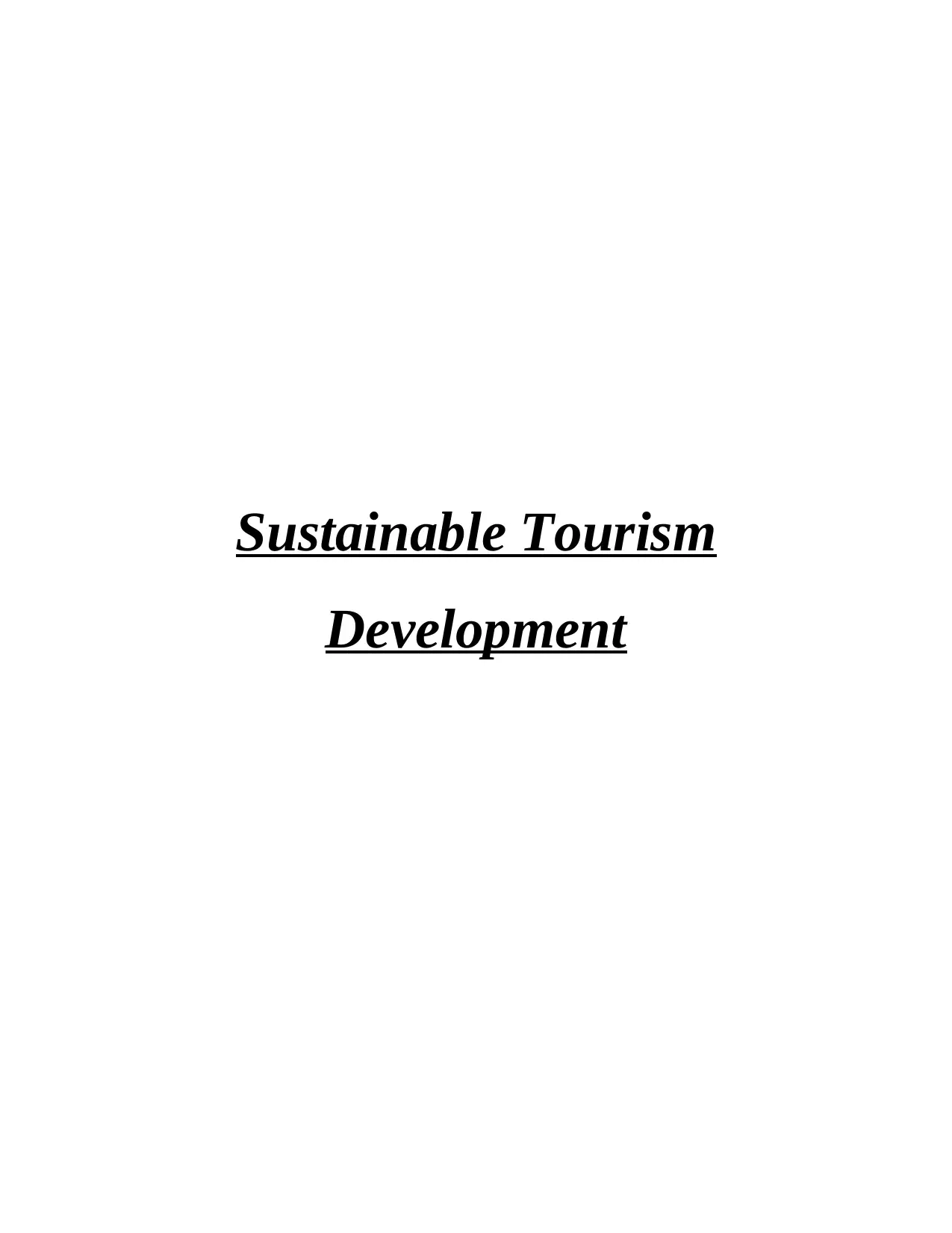
Sustainable Tourism
Development
Development
Secure Best Marks with AI Grader
Need help grading? Try our AI Grader for instant feedback on your assignments.
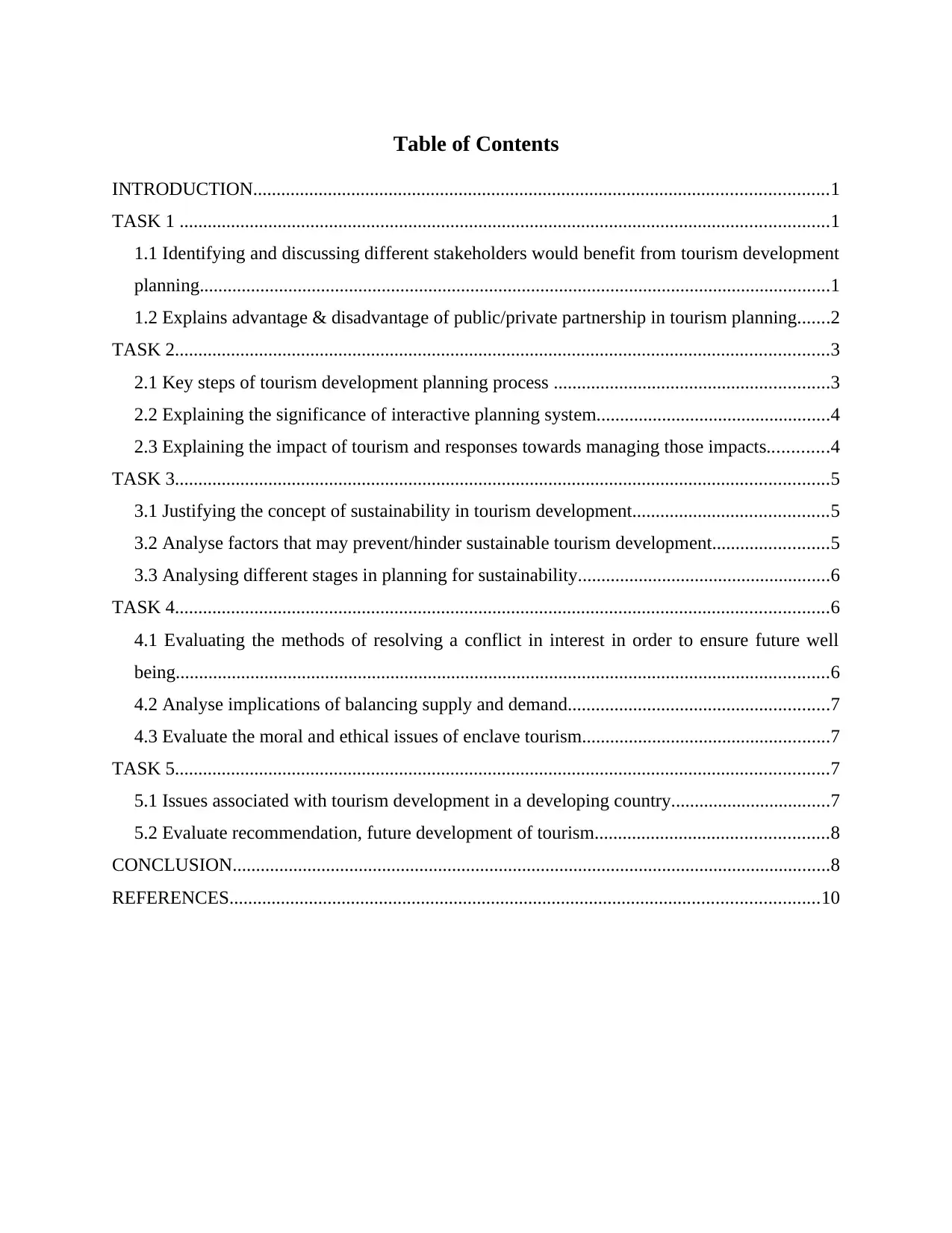
Table of Contents
INTRODUCTION...........................................................................................................................1
TASK 1 ...........................................................................................................................................1
1.1 Identifying and discussing different stakeholders would benefit from tourism development
planning.......................................................................................................................................1
1.2 Explains advantage & disadvantage of public/private partnership in tourism planning.......2
TASK 2............................................................................................................................................3
2.1 Key steps of tourism development planning process ...........................................................3
2.2 Explaining the significance of interactive planning system..................................................4
2.3 Explaining the impact of tourism and responses towards managing those impacts.............4
TASK 3............................................................................................................................................5
3.1 Justifying the concept of sustainability in tourism development..........................................5
3.2 Analyse factors that may prevent/hinder sustainable tourism development.........................5
3.3 Analysing different stages in planning for sustainability......................................................6
TASK 4............................................................................................................................................6
4.1 Evaluating the methods of resolving a conflict in interest in order to ensure future well
being............................................................................................................................................6
4.2 Analyse implications of balancing supply and demand........................................................7
4.3 Evaluate the moral and ethical issues of enclave tourism.....................................................7
TASK 5............................................................................................................................................7
5.1 Issues associated with tourism development in a developing country..................................7
5.2 Evaluate recommendation, future development of tourism..................................................8
CONCLUSION................................................................................................................................8
REFERENCES..............................................................................................................................10
INTRODUCTION...........................................................................................................................1
TASK 1 ...........................................................................................................................................1
1.1 Identifying and discussing different stakeholders would benefit from tourism development
planning.......................................................................................................................................1
1.2 Explains advantage & disadvantage of public/private partnership in tourism planning.......2
TASK 2............................................................................................................................................3
2.1 Key steps of tourism development planning process ...........................................................3
2.2 Explaining the significance of interactive planning system..................................................4
2.3 Explaining the impact of tourism and responses towards managing those impacts.............4
TASK 3............................................................................................................................................5
3.1 Justifying the concept of sustainability in tourism development..........................................5
3.2 Analyse factors that may prevent/hinder sustainable tourism development.........................5
3.3 Analysing different stages in planning for sustainability......................................................6
TASK 4............................................................................................................................................6
4.1 Evaluating the methods of resolving a conflict in interest in order to ensure future well
being............................................................................................................................................6
4.2 Analyse implications of balancing supply and demand........................................................7
4.3 Evaluate the moral and ethical issues of enclave tourism.....................................................7
TASK 5............................................................................................................................................7
5.1 Issues associated with tourism development in a developing country..................................7
5.2 Evaluate recommendation, future development of tourism..................................................8
CONCLUSION................................................................................................................................8
REFERENCES..............................................................................................................................10

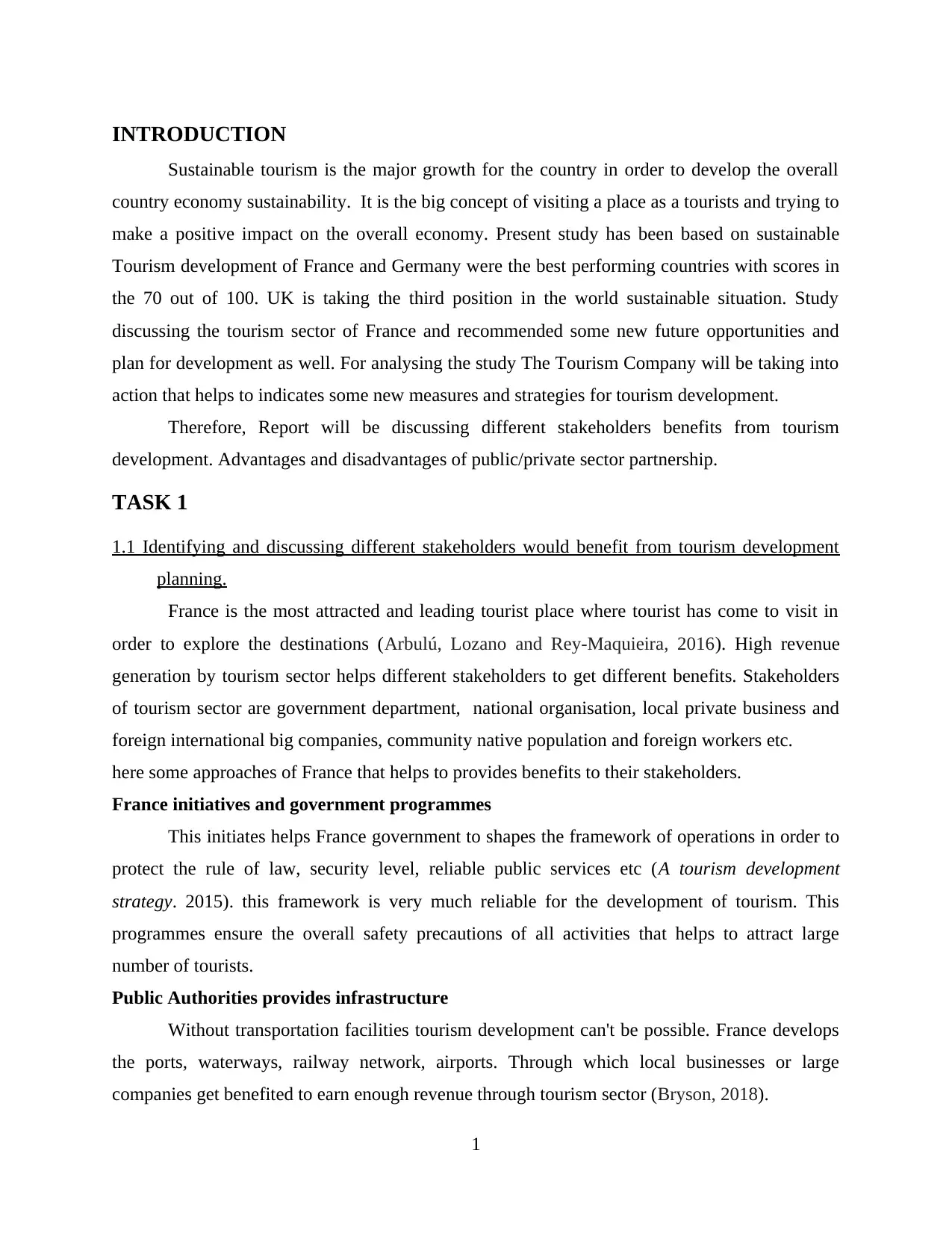
INTRODUCTION
Sustainable tourism is the major growth for the country in order to develop the overall
country economy sustainability. It is the big concept of visiting a place as a tourists and trying to
make a positive impact on the overall economy. Present study has been based on sustainable
Tourism development of France and Germany were the best performing countries with scores in
the 70 out of 100. UK is taking the third position in the world sustainable situation. Study
discussing the tourism sector of France and recommended some new future opportunities and
plan for development as well. For analysing the study The Tourism Company will be taking into
action that helps to indicates some new measures and strategies for tourism development.
Therefore, Report will be discussing different stakeholders benefits from tourism
development. Advantages and disadvantages of public/private sector partnership.
TASK 1
1.1 Identifying and discussing different stakeholders would benefit from tourism development
planning.
France is the most attracted and leading tourist place where tourist has come to visit in
order to explore the destinations (Arbulú, Lozano and Rey-Maquieira, 2016). High revenue
generation by tourism sector helps different stakeholders to get different benefits. Stakeholders
of tourism sector are government department, national organisation, local private business and
foreign international big companies, community native population and foreign workers etc.
here some approaches of France that helps to provides benefits to their stakeholders.
France initiatives and government programmes
This initiates helps France government to shapes the framework of operations in order to
protect the rule of law, security level, reliable public services etc (A tourism development
strategy. 2015). this framework is very much reliable for the development of tourism. This
programmes ensure the overall safety precautions of all activities that helps to attract large
number of tourists.
Public Authorities provides infrastructure
Without transportation facilities tourism development can't be possible. France develops
the ports, waterways, railway network, airports. Through which local businesses or large
companies get benefited to earn enough revenue through tourism sector (Bryson, 2018).
1
Sustainable tourism is the major growth for the country in order to develop the overall
country economy sustainability. It is the big concept of visiting a place as a tourists and trying to
make a positive impact on the overall economy. Present study has been based on sustainable
Tourism development of France and Germany were the best performing countries with scores in
the 70 out of 100. UK is taking the third position in the world sustainable situation. Study
discussing the tourism sector of France and recommended some new future opportunities and
plan for development as well. For analysing the study The Tourism Company will be taking into
action that helps to indicates some new measures and strategies for tourism development.
Therefore, Report will be discussing different stakeholders benefits from tourism
development. Advantages and disadvantages of public/private sector partnership.
TASK 1
1.1 Identifying and discussing different stakeholders would benefit from tourism development
planning.
France is the most attracted and leading tourist place where tourist has come to visit in
order to explore the destinations (Arbulú, Lozano and Rey-Maquieira, 2016). High revenue
generation by tourism sector helps different stakeholders to get different benefits. Stakeholders
of tourism sector are government department, national organisation, local private business and
foreign international big companies, community native population and foreign workers etc.
here some approaches of France that helps to provides benefits to their stakeholders.
France initiatives and government programmes
This initiates helps France government to shapes the framework of operations in order to
protect the rule of law, security level, reliable public services etc (A tourism development
strategy. 2015). this framework is very much reliable for the development of tourism. This
programmes ensure the overall safety precautions of all activities that helps to attract large
number of tourists.
Public Authorities provides infrastructure
Without transportation facilities tourism development can't be possible. France develops
the ports, waterways, railway network, airports. Through which local businesses or large
companies get benefited to earn enough revenue through tourism sector (Bryson, 2018).
1
Secure Best Marks with AI Grader
Need help grading? Try our AI Grader for instant feedback on your assignments.
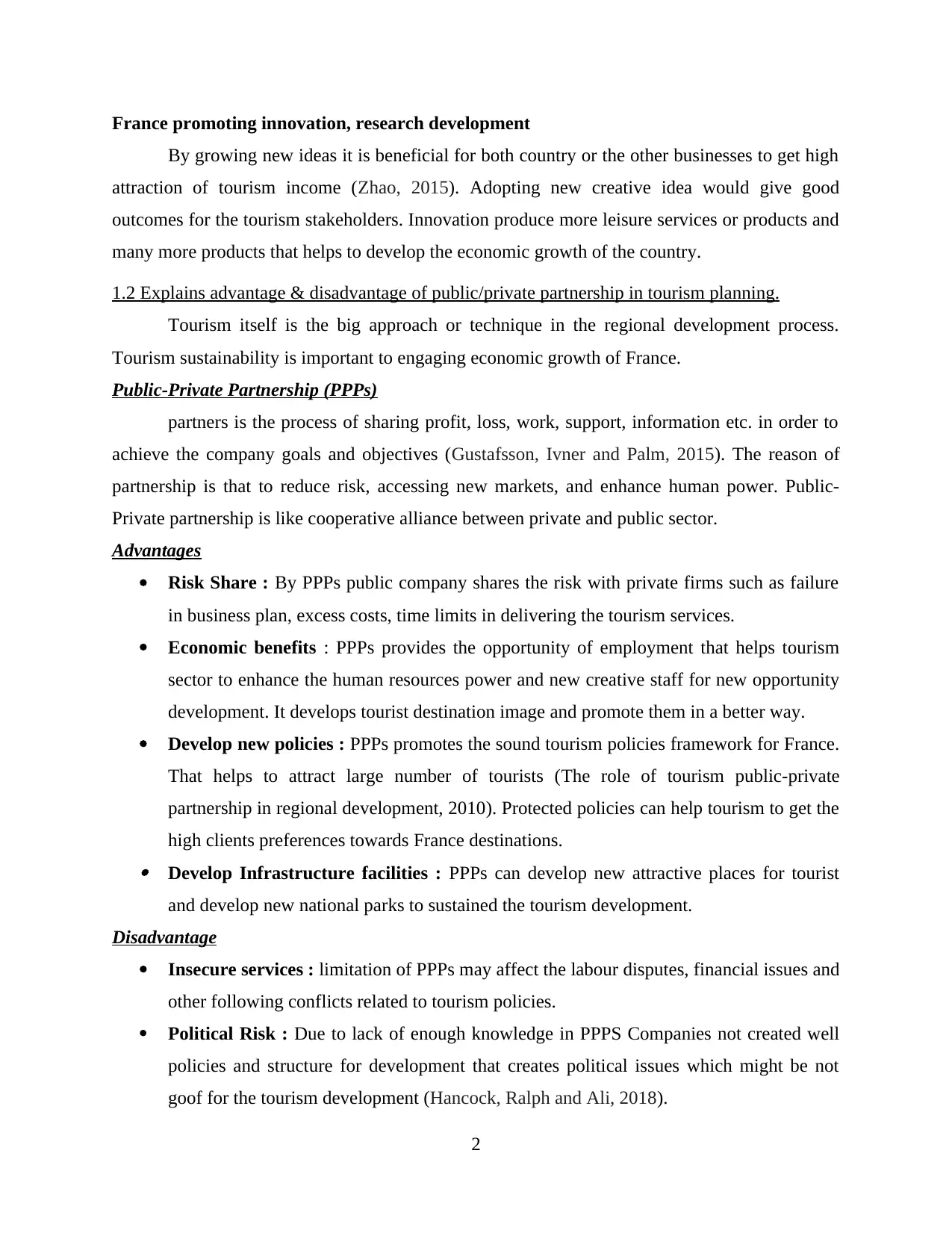
France promoting innovation, research development
By growing new ideas it is beneficial for both country or the other businesses to get high
attraction of tourism income (Zhao, 2015). Adopting new creative idea would give good
outcomes for the tourism stakeholders. Innovation produce more leisure services or products and
many more products that helps to develop the economic growth of the country.
1.2 Explains advantage & disadvantage of public/private partnership in tourism planning.
Tourism itself is the big approach or technique in the regional development process.
Tourism sustainability is important to engaging economic growth of France.
Public-Private Partnership (PPPs)
partners is the process of sharing profit, loss, work, support, information etc. in order to
achieve the company goals and objectives (Gustafsson, Ivner and Palm, 2015). The reason of
partnership is that to reduce risk, accessing new markets, and enhance human power. Public-
Private partnership is like cooperative alliance between private and public sector.
Advantages
Risk Share : By PPPs public company shares the risk with private firms such as failure
in business plan, excess costs, time limits in delivering the tourism services.
Economic benefits : PPPs provides the opportunity of employment that helps tourism
sector to enhance the human resources power and new creative staff for new opportunity
development. It develops tourist destination image and promote them in a better way.
Develop new policies : PPPs promotes the sound tourism policies framework for France.
That helps to attract large number of tourists (The role of tourism public-private
partnership in regional development, 2010). Protected policies can help tourism to get the
high clients preferences towards France destinations. Develop Infrastructure facilities : PPPs can develop new attractive places for tourist
and develop new national parks to sustained the tourism development.
Disadvantage
Insecure services : limitation of PPPs may affect the labour disputes, financial issues and
other following conflicts related to tourism policies.
Political Risk : Due to lack of enough knowledge in PPPS Companies not created well
policies and structure for development that creates political issues which might be not
goof for the tourism development (Hancock, Ralph and Ali, 2018).
2
By growing new ideas it is beneficial for both country or the other businesses to get high
attraction of tourism income (Zhao, 2015). Adopting new creative idea would give good
outcomes for the tourism stakeholders. Innovation produce more leisure services or products and
many more products that helps to develop the economic growth of the country.
1.2 Explains advantage & disadvantage of public/private partnership in tourism planning.
Tourism itself is the big approach or technique in the regional development process.
Tourism sustainability is important to engaging economic growth of France.
Public-Private Partnership (PPPs)
partners is the process of sharing profit, loss, work, support, information etc. in order to
achieve the company goals and objectives (Gustafsson, Ivner and Palm, 2015). The reason of
partnership is that to reduce risk, accessing new markets, and enhance human power. Public-
Private partnership is like cooperative alliance between private and public sector.
Advantages
Risk Share : By PPPs public company shares the risk with private firms such as failure
in business plan, excess costs, time limits in delivering the tourism services.
Economic benefits : PPPs provides the opportunity of employment that helps tourism
sector to enhance the human resources power and new creative staff for new opportunity
development. It develops tourist destination image and promote them in a better way.
Develop new policies : PPPs promotes the sound tourism policies framework for France.
That helps to attract large number of tourists (The role of tourism public-private
partnership in regional development, 2010). Protected policies can help tourism to get the
high clients preferences towards France destinations. Develop Infrastructure facilities : PPPs can develop new attractive places for tourist
and develop new national parks to sustained the tourism development.
Disadvantage
Insecure services : limitation of PPPs may affect the labour disputes, financial issues and
other following conflicts related to tourism policies.
Political Risk : Due to lack of enough knowledge in PPPS Companies not created well
policies and structure for development that creates political issues which might be not
goof for the tourism development (Hancock, Ralph and Ali, 2018).
2
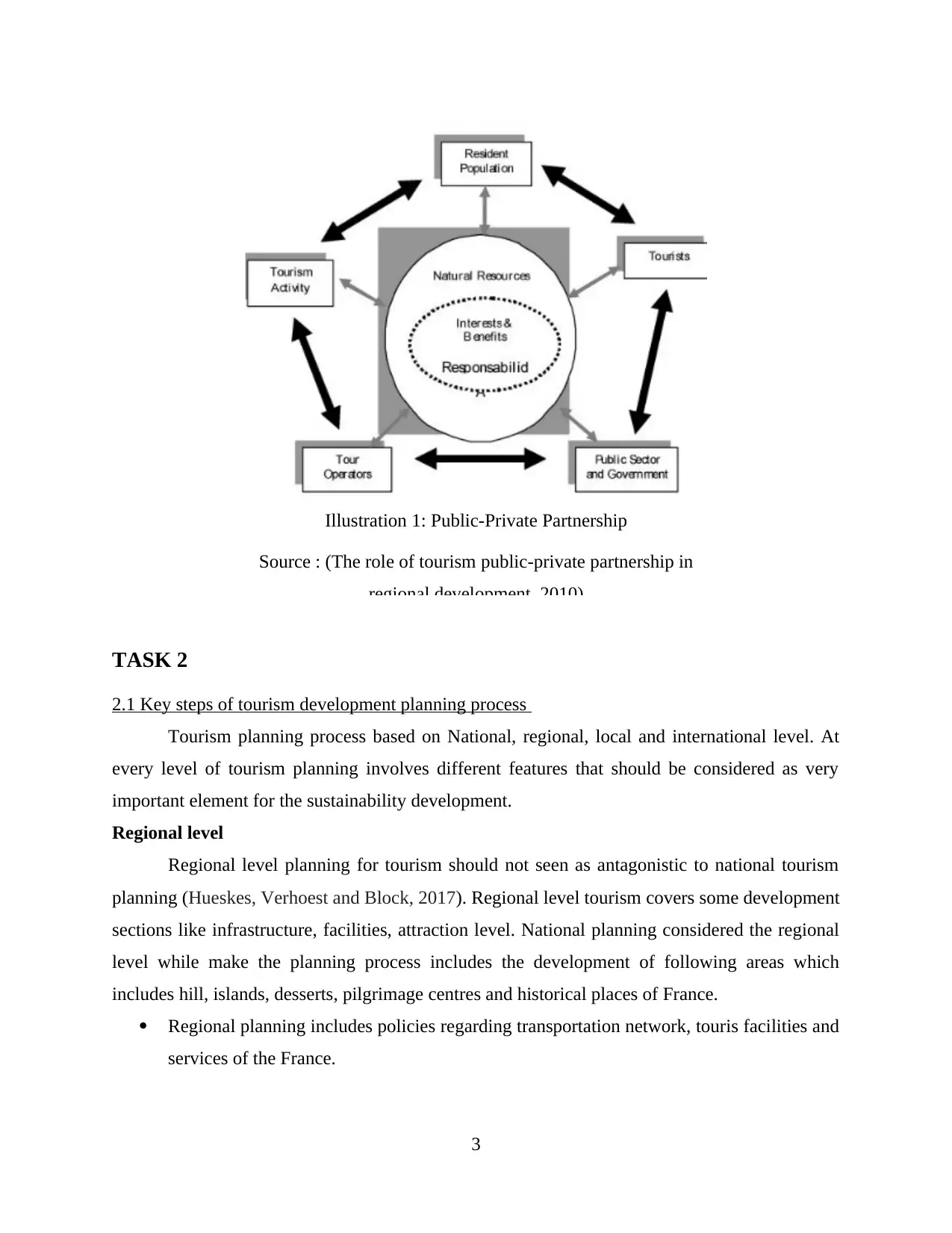
TASK 2
2.1 Key steps of tourism development planning process
Tourism planning process based on National, regional, local and international level. At
every level of tourism planning involves different features that should be considered as very
important element for the sustainability development.
Regional level
Regional level planning for tourism should not seen as antagonistic to national tourism
planning (Hueskes, Verhoest and Block, 2017). Regional level tourism covers some development
sections like infrastructure, facilities, attraction level. National planning considered the regional
level while make the planning process includes the development of following areas which
includes hill, islands, desserts, pilgrimage centres and historical places of France.
Regional planning includes policies regarding transportation network, touris facilities and
services of the France.
3
Illustration 1: Public-Private Partnership
Source : (The role of tourism public-private partnership in
regional development, 2010)
2.1 Key steps of tourism development planning process
Tourism planning process based on National, regional, local and international level. At
every level of tourism planning involves different features that should be considered as very
important element for the sustainability development.
Regional level
Regional level planning for tourism should not seen as antagonistic to national tourism
planning (Hueskes, Verhoest and Block, 2017). Regional level tourism covers some development
sections like infrastructure, facilities, attraction level. National planning considered the regional
level while make the planning process includes the development of following areas which
includes hill, islands, desserts, pilgrimage centres and historical places of France.
Regional planning includes policies regarding transportation network, touris facilities and
services of the France.
3
Illustration 1: Public-Private Partnership
Source : (The role of tourism public-private partnership in
regional development, 2010)
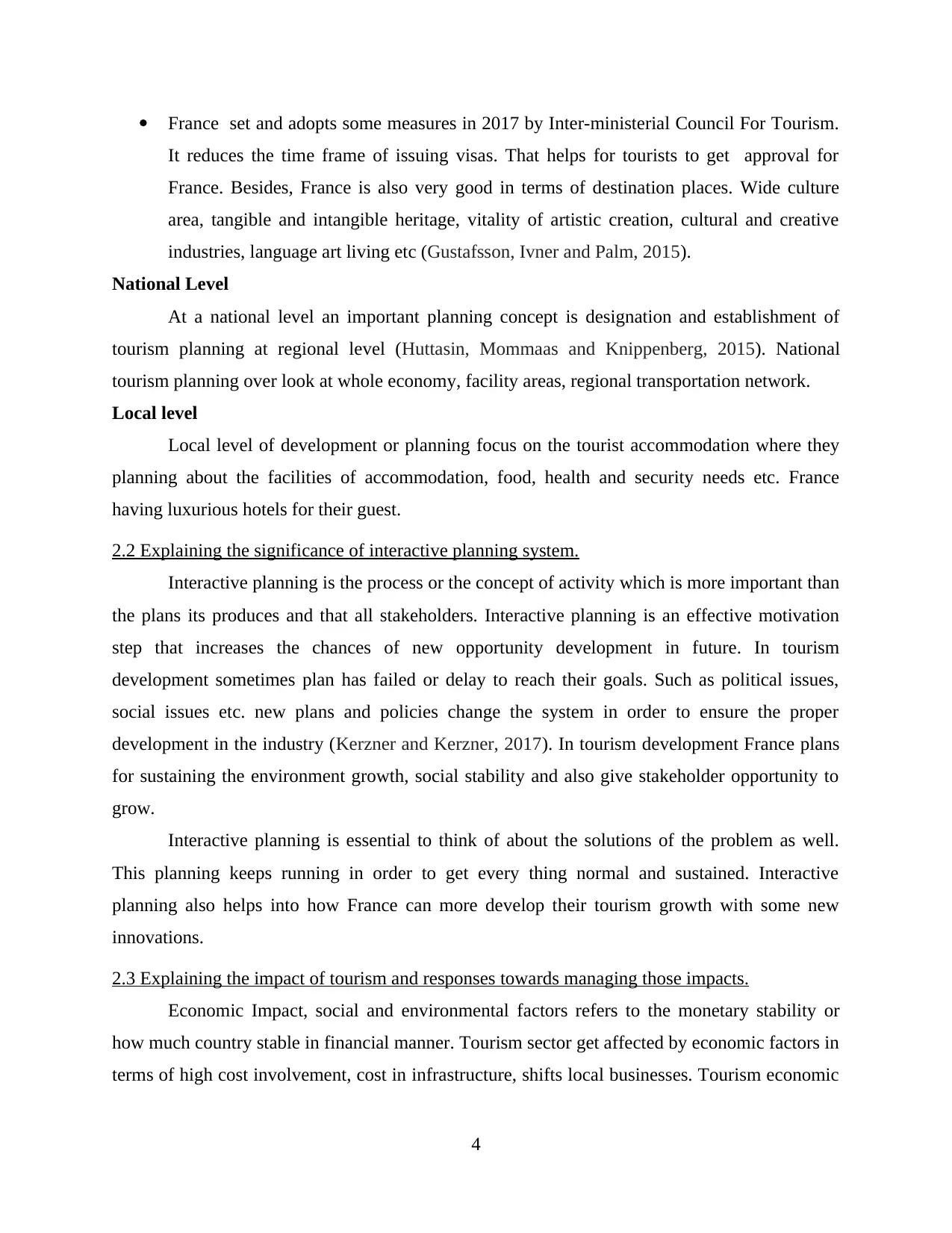
France set and adopts some measures in 2017 by Inter-ministerial Council For Tourism.
It reduces the time frame of issuing visas. That helps for tourists to get approval for
France. Besides, France is also very good in terms of destination places. Wide culture
area, tangible and intangible heritage, vitality of artistic creation, cultural and creative
industries, language art living etc (Gustafsson, Ivner and Palm, 2015).
National Level
At a national level an important planning concept is designation and establishment of
tourism planning at regional level (Huttasin, Mommaas and Knippenberg, 2015). National
tourism planning over look at whole economy, facility areas, regional transportation network.
Local level
Local level of development or planning focus on the tourist accommodation where they
planning about the facilities of accommodation, food, health and security needs etc. France
having luxurious hotels for their guest.
2.2 Explaining the significance of interactive planning system.
Interactive planning is the process or the concept of activity which is more important than
the plans its produces and that all stakeholders. Interactive planning is an effective motivation
step that increases the chances of new opportunity development in future. In tourism
development sometimes plan has failed or delay to reach their goals. Such as political issues,
social issues etc. new plans and policies change the system in order to ensure the proper
development in the industry (Kerzner and Kerzner, 2017). In tourism development France plans
for sustaining the environment growth, social stability and also give stakeholder opportunity to
grow.
Interactive planning is essential to think of about the solutions of the problem as well.
This planning keeps running in order to get every thing normal and sustained. Interactive
planning also helps into how France can more develop their tourism growth with some new
innovations.
2.3 Explaining the impact of tourism and responses towards managing those impacts.
Economic Impact, social and environmental factors refers to the monetary stability or
how much country stable in financial manner. Tourism sector get affected by economic factors in
terms of high cost involvement, cost in infrastructure, shifts local businesses. Tourism economic
4
It reduces the time frame of issuing visas. That helps for tourists to get approval for
France. Besides, France is also very good in terms of destination places. Wide culture
area, tangible and intangible heritage, vitality of artistic creation, cultural and creative
industries, language art living etc (Gustafsson, Ivner and Palm, 2015).
National Level
At a national level an important planning concept is designation and establishment of
tourism planning at regional level (Huttasin, Mommaas and Knippenberg, 2015). National
tourism planning over look at whole economy, facility areas, regional transportation network.
Local level
Local level of development or planning focus on the tourist accommodation where they
planning about the facilities of accommodation, food, health and security needs etc. France
having luxurious hotels for their guest.
2.2 Explaining the significance of interactive planning system.
Interactive planning is the process or the concept of activity which is more important than
the plans its produces and that all stakeholders. Interactive planning is an effective motivation
step that increases the chances of new opportunity development in future. In tourism
development sometimes plan has failed or delay to reach their goals. Such as political issues,
social issues etc. new plans and policies change the system in order to ensure the proper
development in the industry (Kerzner and Kerzner, 2017). In tourism development France plans
for sustaining the environment growth, social stability and also give stakeholder opportunity to
grow.
Interactive planning is essential to think of about the solutions of the problem as well.
This planning keeps running in order to get every thing normal and sustained. Interactive
planning also helps into how France can more develop their tourism growth with some new
innovations.
2.3 Explaining the impact of tourism and responses towards managing those impacts.
Economic Impact, social and environmental factors refers to the monetary stability or
how much country stable in financial manner. Tourism sector get affected by economic factors in
terms of high cost involvement, cost in infrastructure, shifts local businesses. Tourism economic
4
Paraphrase This Document
Need a fresh take? Get an instant paraphrase of this document with our AI Paraphraser
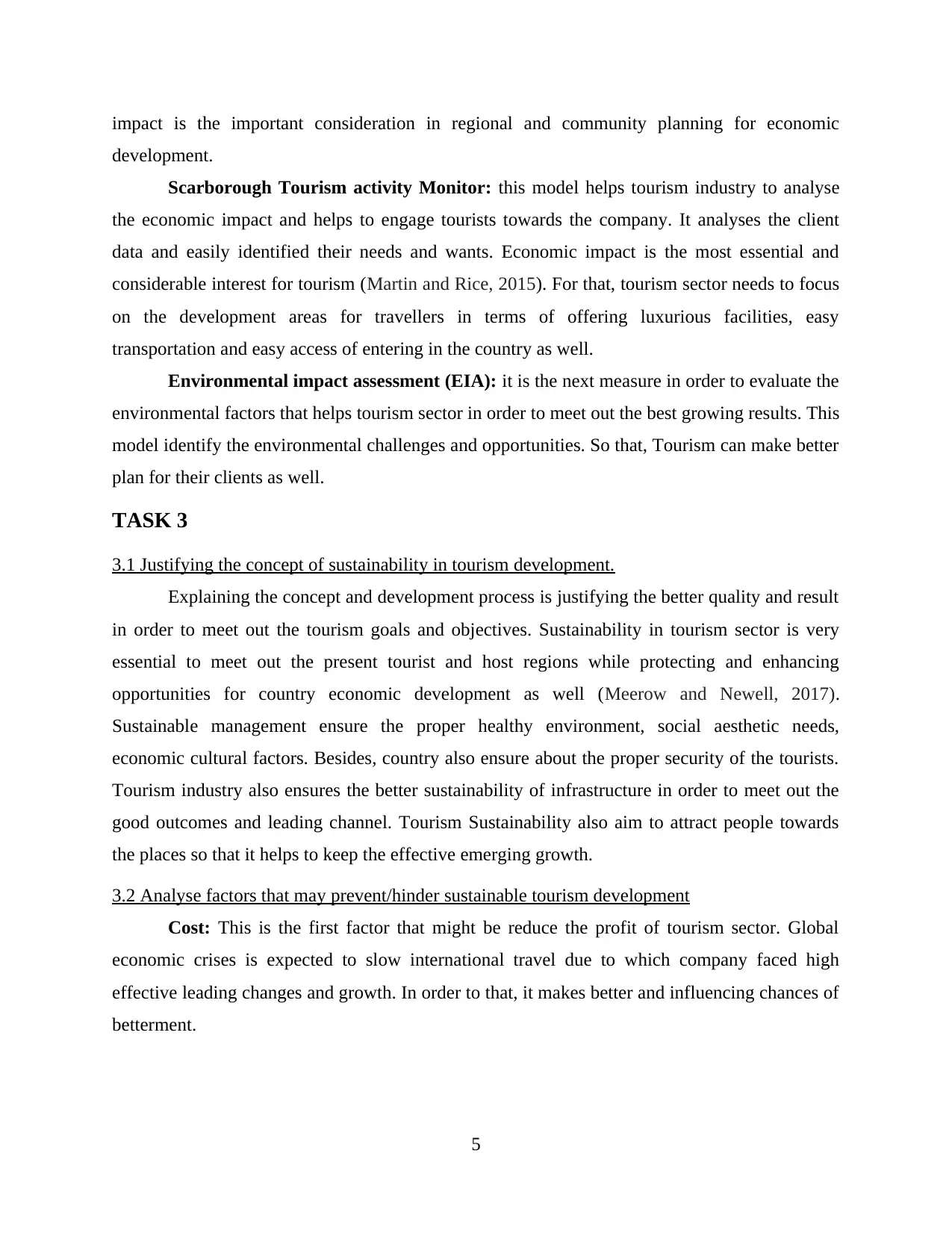
impact is the important consideration in regional and community planning for economic
development.
Scarborough Tourism activity Monitor: this model helps tourism industry to analyse
the economic impact and helps to engage tourists towards the company. It analyses the client
data and easily identified their needs and wants. Economic impact is the most essential and
considerable interest for tourism (Martin and Rice, 2015). For that, tourism sector needs to focus
on the development areas for travellers in terms of offering luxurious facilities, easy
transportation and easy access of entering in the country as well.
Environmental impact assessment (EIA): it is the next measure in order to evaluate the
environmental factors that helps tourism sector in order to meet out the best growing results. This
model identify the environmental challenges and opportunities. So that, Tourism can make better
plan for their clients as well.
TASK 3
3.1 Justifying the concept of sustainability in tourism development.
Explaining the concept and development process is justifying the better quality and result
in order to meet out the tourism goals and objectives. Sustainability in tourism sector is very
essential to meet out the present tourist and host regions while protecting and enhancing
opportunities for country economic development as well (Meerow and Newell, 2017).
Sustainable management ensure the proper healthy environment, social aesthetic needs,
economic cultural factors. Besides, country also ensure about the proper security of the tourists.
Tourism industry also ensures the better sustainability of infrastructure in order to meet out the
good outcomes and leading channel. Tourism Sustainability also aim to attract people towards
the places so that it helps to keep the effective emerging growth.
3.2 Analyse factors that may prevent/hinder sustainable tourism development
Cost: This is the first factor that might be reduce the profit of tourism sector. Global
economic crises is expected to slow international travel due to which company faced high
effective leading changes and growth. In order to that, it makes better and influencing chances of
betterment.
5
development.
Scarborough Tourism activity Monitor: this model helps tourism industry to analyse
the economic impact and helps to engage tourists towards the company. It analyses the client
data and easily identified their needs and wants. Economic impact is the most essential and
considerable interest for tourism (Martin and Rice, 2015). For that, tourism sector needs to focus
on the development areas for travellers in terms of offering luxurious facilities, easy
transportation and easy access of entering in the country as well.
Environmental impact assessment (EIA): it is the next measure in order to evaluate the
environmental factors that helps tourism sector in order to meet out the best growing results. This
model identify the environmental challenges and opportunities. So that, Tourism can make better
plan for their clients as well.
TASK 3
3.1 Justifying the concept of sustainability in tourism development.
Explaining the concept and development process is justifying the better quality and result
in order to meet out the tourism goals and objectives. Sustainability in tourism sector is very
essential to meet out the present tourist and host regions while protecting and enhancing
opportunities for country economic development as well (Meerow and Newell, 2017).
Sustainable management ensure the proper healthy environment, social aesthetic needs,
economic cultural factors. Besides, country also ensure about the proper security of the tourists.
Tourism industry also ensures the better sustainability of infrastructure in order to meet out the
good outcomes and leading channel. Tourism Sustainability also aim to attract people towards
the places so that it helps to keep the effective emerging growth.
3.2 Analyse factors that may prevent/hinder sustainable tourism development
Cost: This is the first factor that might be reduce the profit of tourism sector. Global
economic crises is expected to slow international travel due to which company faced high
effective leading changes and growth. In order to that, it makes better and influencing chances of
betterment.
5
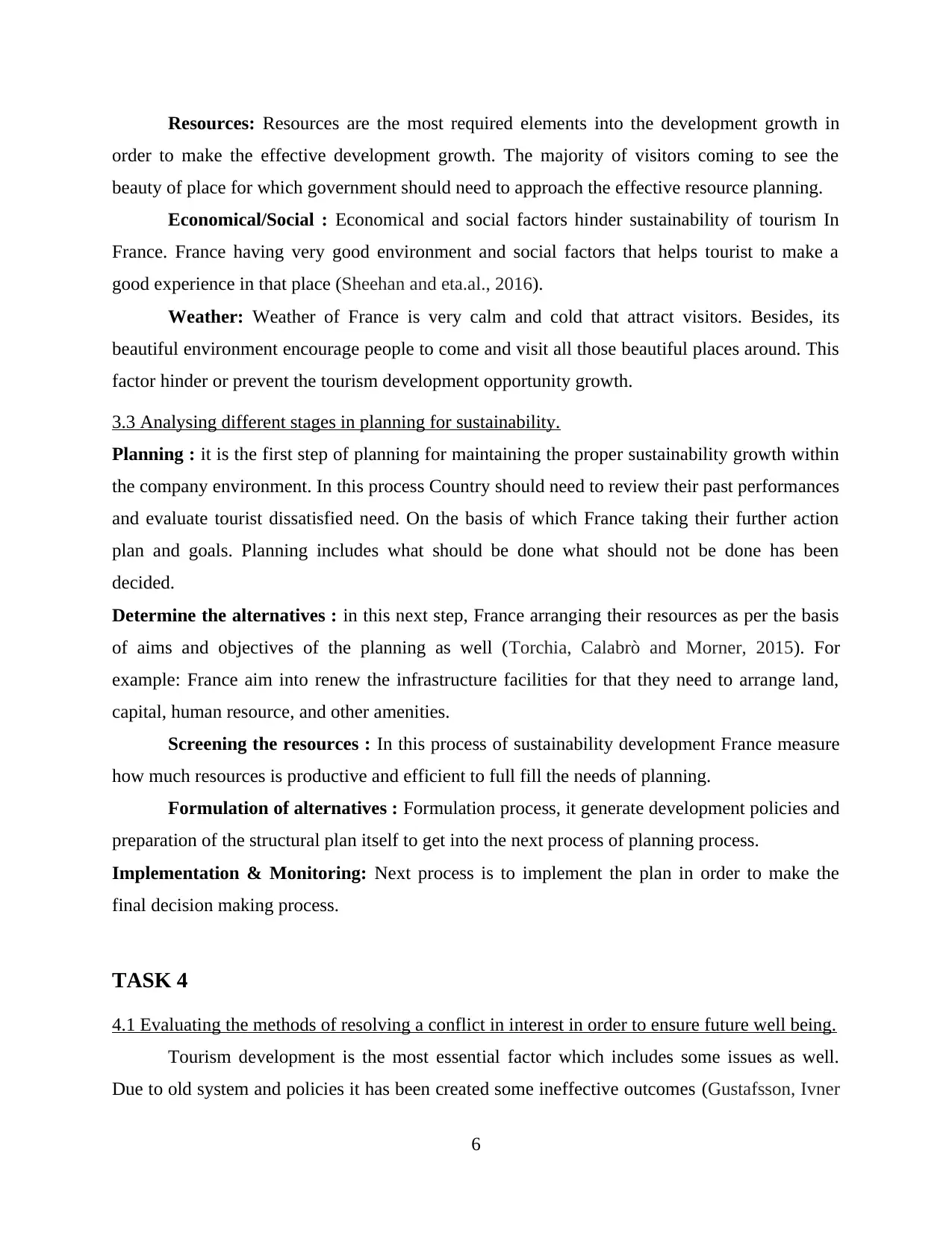
Resources: Resources are the most required elements into the development growth in
order to make the effective development growth. The majority of visitors coming to see the
beauty of place for which government should need to approach the effective resource planning.
Economical/Social : Economical and social factors hinder sustainability of tourism In
France. France having very good environment and social factors that helps tourist to make a
good experience in that place (Sheehan and eta.al., 2016).
Weather: Weather of France is very calm and cold that attract visitors. Besides, its
beautiful environment encourage people to come and visit all those beautiful places around. This
factor hinder or prevent the tourism development opportunity growth.
3.3 Analysing different stages in planning for sustainability.
Planning : it is the first step of planning for maintaining the proper sustainability growth within
the company environment. In this process Country should need to review their past performances
and evaluate tourist dissatisfied need. On the basis of which France taking their further action
plan and goals. Planning includes what should be done what should not be done has been
decided.
Determine the alternatives : in this next step, France arranging their resources as per the basis
of aims and objectives of the planning as well (Torchia, Calabrò and Morner, 2015). For
example: France aim into renew the infrastructure facilities for that they need to arrange land,
capital, human resource, and other amenities.
Screening the resources : In this process of sustainability development France measure
how much resources is productive and efficient to full fill the needs of planning.
Formulation of alternatives : Formulation process, it generate development policies and
preparation of the structural plan itself to get into the next process of planning process.
Implementation & Monitoring: Next process is to implement the plan in order to make the
final decision making process.
TASK 4
4.1 Evaluating the methods of resolving a conflict in interest in order to ensure future well being.
Tourism development is the most essential factor which includes some issues as well.
Due to old system and policies it has been created some ineffective outcomes (Gustafsson, Ivner
6
order to make the effective development growth. The majority of visitors coming to see the
beauty of place for which government should need to approach the effective resource planning.
Economical/Social : Economical and social factors hinder sustainability of tourism In
France. France having very good environment and social factors that helps tourist to make a
good experience in that place (Sheehan and eta.al., 2016).
Weather: Weather of France is very calm and cold that attract visitors. Besides, its
beautiful environment encourage people to come and visit all those beautiful places around. This
factor hinder or prevent the tourism development opportunity growth.
3.3 Analysing different stages in planning for sustainability.
Planning : it is the first step of planning for maintaining the proper sustainability growth within
the company environment. In this process Country should need to review their past performances
and evaluate tourist dissatisfied need. On the basis of which France taking their further action
plan and goals. Planning includes what should be done what should not be done has been
decided.
Determine the alternatives : in this next step, France arranging their resources as per the basis
of aims and objectives of the planning as well (Torchia, Calabrò and Morner, 2015). For
example: France aim into renew the infrastructure facilities for that they need to arrange land,
capital, human resource, and other amenities.
Screening the resources : In this process of sustainability development France measure
how much resources is productive and efficient to full fill the needs of planning.
Formulation of alternatives : Formulation process, it generate development policies and
preparation of the structural plan itself to get into the next process of planning process.
Implementation & Monitoring: Next process is to implement the plan in order to make the
final decision making process.
TASK 4
4.1 Evaluating the methods of resolving a conflict in interest in order to ensure future well being.
Tourism development is the most essential factor which includes some issues as well.
Due to old system and policies it has been created some ineffective outcomes (Gustafsson, Ivner
6
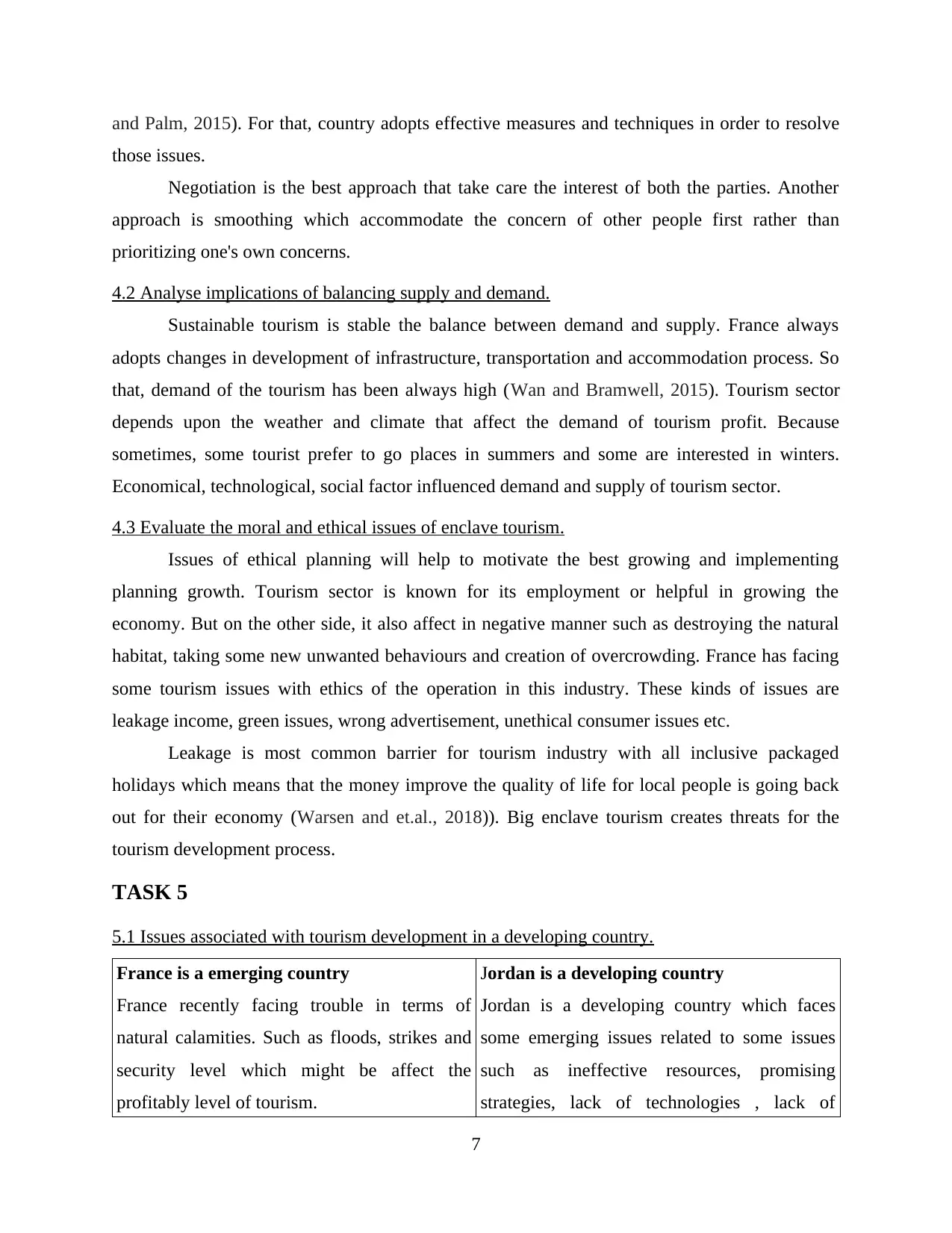
and Palm, 2015). For that, country adopts effective measures and techniques in order to resolve
those issues.
Negotiation is the best approach that take care the interest of both the parties. Another
approach is smoothing which accommodate the concern of other people first rather than
prioritizing one's own concerns.
4.2 Analyse implications of balancing supply and demand.
Sustainable tourism is stable the balance between demand and supply. France always
adopts changes in development of infrastructure, transportation and accommodation process. So
that, demand of the tourism has been always high (Wan and Bramwell, 2015). Tourism sector
depends upon the weather and climate that affect the demand of tourism profit. Because
sometimes, some tourist prefer to go places in summers and some are interested in winters.
Economical, technological, social factor influenced demand and supply of tourism sector.
4.3 Evaluate the moral and ethical issues of enclave tourism.
Issues of ethical planning will help to motivate the best growing and implementing
planning growth. Tourism sector is known for its employment or helpful in growing the
economy. But on the other side, it also affect in negative manner such as destroying the natural
habitat, taking some new unwanted behaviours and creation of overcrowding. France has facing
some tourism issues with ethics of the operation in this industry. These kinds of issues are
leakage income, green issues, wrong advertisement, unethical consumer issues etc.
Leakage is most common barrier for tourism industry with all inclusive packaged
holidays which means that the money improve the quality of life for local people is going back
out for their economy (Warsen and et.al., 2018)). Big enclave tourism creates threats for the
tourism development process.
TASK 5
5.1 Issues associated with tourism development in a developing country.
France is a emerging country
France recently facing trouble in terms of
natural calamities. Such as floods, strikes and
security level which might be affect the
profitably level of tourism.
Jordan is a developing country
Jordan is a developing country which faces
some emerging issues related to some issues
such as ineffective resources, promising
strategies, lack of technologies , lack of
7
those issues.
Negotiation is the best approach that take care the interest of both the parties. Another
approach is smoothing which accommodate the concern of other people first rather than
prioritizing one's own concerns.
4.2 Analyse implications of balancing supply and demand.
Sustainable tourism is stable the balance between demand and supply. France always
adopts changes in development of infrastructure, transportation and accommodation process. So
that, demand of the tourism has been always high (Wan and Bramwell, 2015). Tourism sector
depends upon the weather and climate that affect the demand of tourism profit. Because
sometimes, some tourist prefer to go places in summers and some are interested in winters.
Economical, technological, social factor influenced demand and supply of tourism sector.
4.3 Evaluate the moral and ethical issues of enclave tourism.
Issues of ethical planning will help to motivate the best growing and implementing
planning growth. Tourism sector is known for its employment or helpful in growing the
economy. But on the other side, it also affect in negative manner such as destroying the natural
habitat, taking some new unwanted behaviours and creation of overcrowding. France has facing
some tourism issues with ethics of the operation in this industry. These kinds of issues are
leakage income, green issues, wrong advertisement, unethical consumer issues etc.
Leakage is most common barrier for tourism industry with all inclusive packaged
holidays which means that the money improve the quality of life for local people is going back
out for their economy (Warsen and et.al., 2018)). Big enclave tourism creates threats for the
tourism development process.
TASK 5
5.1 Issues associated with tourism development in a developing country.
France is a emerging country
France recently facing trouble in terms of
natural calamities. Such as floods, strikes and
security level which might be affect the
profitably level of tourism.
Jordan is a developing country
Jordan is a developing country which faces
some emerging issues related to some issues
such as ineffective resources, promising
strategies, lack of technologies , lack of
7
Secure Best Marks with AI Grader
Need help grading? Try our AI Grader for instant feedback on your assignments.
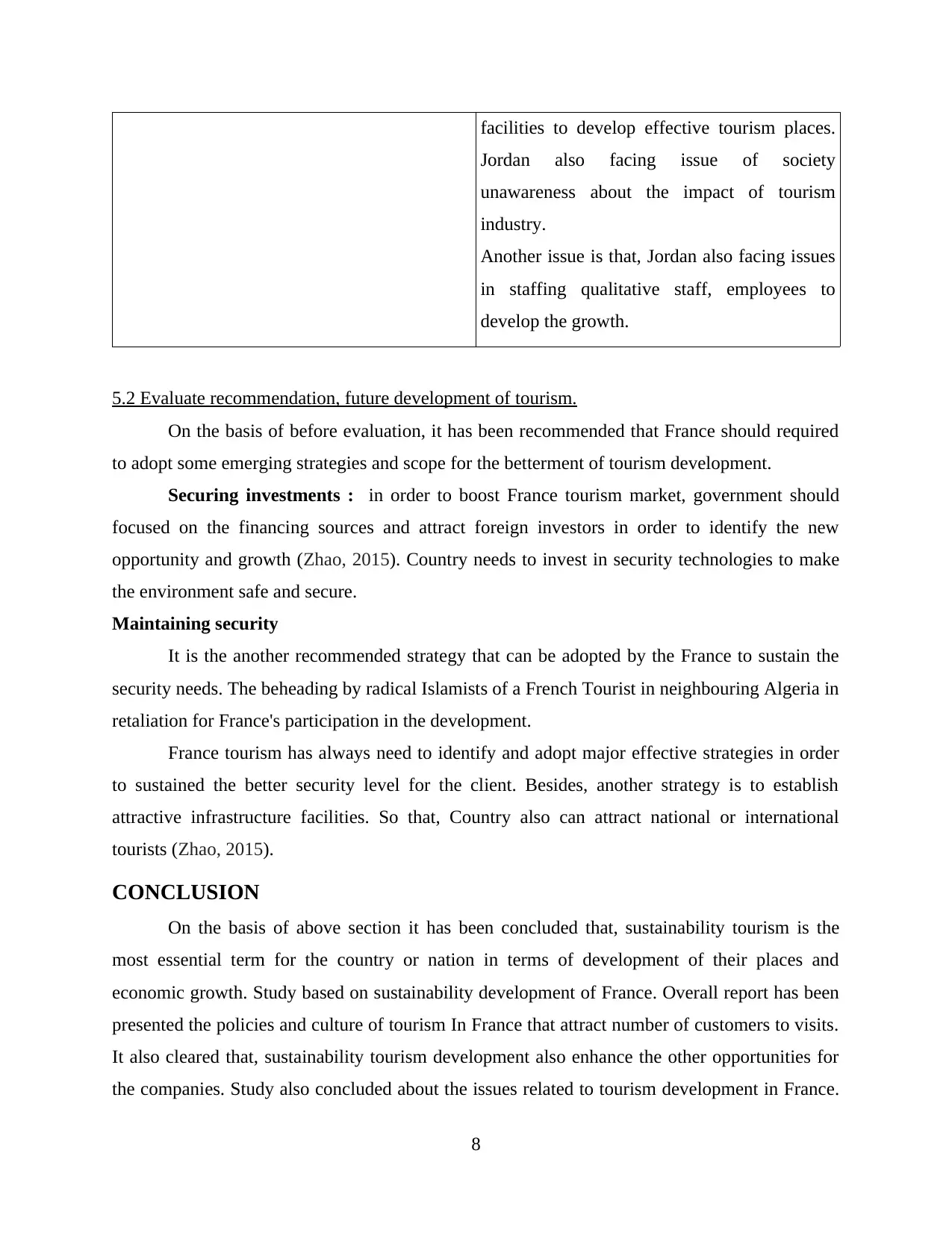
facilities to develop effective tourism places.
Jordan also facing issue of society
unawareness about the impact of tourism
industry.
Another issue is that, Jordan also facing issues
in staffing qualitative staff, employees to
develop the growth.
5.2 Evaluate recommendation, future development of tourism.
On the basis of before evaluation, it has been recommended that France should required
to adopt some emerging strategies and scope for the betterment of tourism development.
Securing investments : in order to boost France tourism market, government should
focused on the financing sources and attract foreign investors in order to identify the new
opportunity and growth (Zhao, 2015). Country needs to invest in security technologies to make
the environment safe and secure.
Maintaining security
It is the another recommended strategy that can be adopted by the France to sustain the
security needs. The beheading by radical Islamists of a French Tourist in neighbouring Algeria in
retaliation for France's participation in the development.
France tourism has always need to identify and adopt major effective strategies in order
to sustained the better security level for the client. Besides, another strategy is to establish
attractive infrastructure facilities. So that, Country also can attract national or international
tourists (Zhao, 2015).
CONCLUSION
On the basis of above section it has been concluded that, sustainability tourism is the
most essential term for the country or nation in terms of development of their places and
economic growth. Study based on sustainability development of France. Overall report has been
presented the policies and culture of tourism In France that attract number of customers to visits.
It also cleared that, sustainability tourism development also enhance the other opportunities for
the companies. Study also concluded about the issues related to tourism development in France.
8
Jordan also facing issue of society
unawareness about the impact of tourism
industry.
Another issue is that, Jordan also facing issues
in staffing qualitative staff, employees to
develop the growth.
5.2 Evaluate recommendation, future development of tourism.
On the basis of before evaluation, it has been recommended that France should required
to adopt some emerging strategies and scope for the betterment of tourism development.
Securing investments : in order to boost France tourism market, government should
focused on the financing sources and attract foreign investors in order to identify the new
opportunity and growth (Zhao, 2015). Country needs to invest in security technologies to make
the environment safe and secure.
Maintaining security
It is the another recommended strategy that can be adopted by the France to sustain the
security needs. The beheading by radical Islamists of a French Tourist in neighbouring Algeria in
retaliation for France's participation in the development.
France tourism has always need to identify and adopt major effective strategies in order
to sustained the better security level for the client. Besides, another strategy is to establish
attractive infrastructure facilities. So that, Country also can attract national or international
tourists (Zhao, 2015).
CONCLUSION
On the basis of above section it has been concluded that, sustainability tourism is the
most essential term for the country or nation in terms of development of their places and
economic growth. Study based on sustainability development of France. Overall report has been
presented the policies and culture of tourism In France that attract number of customers to visits.
It also cleared that, sustainability tourism development also enhance the other opportunities for
the companies. Study also concluded about the issues related to tourism development in France.
8

Besides, report also recommended for the future development issues in both destination.
Recommendation is also concluded about the new opportunity and strategies growth. Overall,
study explained the importance of tourism in order to enhance the new opportunity of economic
growth.
9
Recommendation is also concluded about the new opportunity and strategies growth. Overall,
study explained the importance of tourism in order to enhance the new opportunity of economic
growth.
9
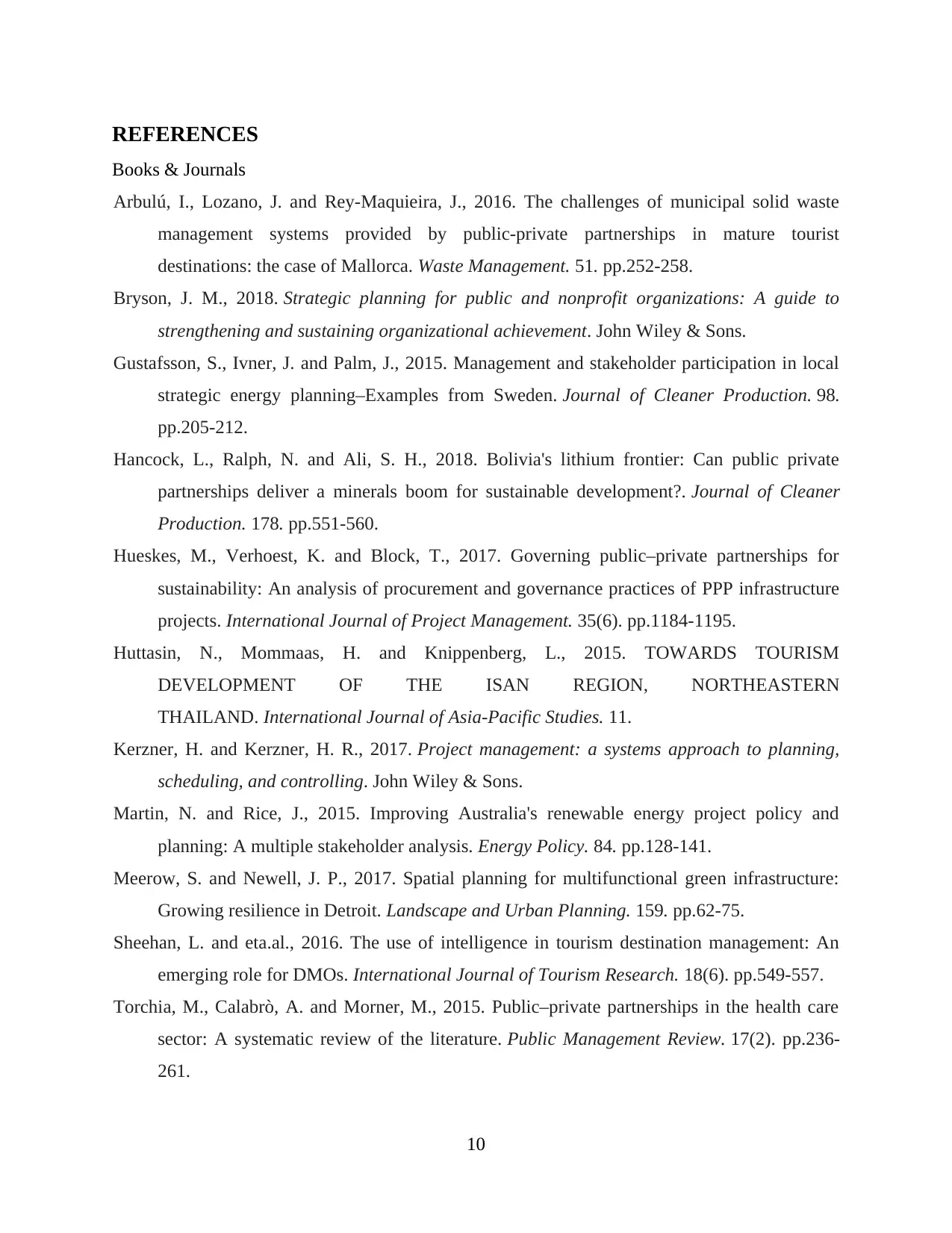
REFERENCES
Books & Journals
Arbulú, I., Lozano, J. and Rey-Maquieira, J., 2016. The challenges of municipal solid waste
management systems provided by public-private partnerships in mature tourist
destinations: the case of Mallorca. Waste Management. 51. pp.252-258.
Bryson, J. M., 2018. Strategic planning for public and nonprofit organizations: A guide to
strengthening and sustaining organizational achievement. John Wiley & Sons.
Gustafsson, S., Ivner, J. and Palm, J., 2015. Management and stakeholder participation in local
strategic energy planning–Examples from Sweden. Journal of Cleaner Production. 98.
pp.205-212.
Hancock, L., Ralph, N. and Ali, S. H., 2018. Bolivia's lithium frontier: Can public private
partnerships deliver a minerals boom for sustainable development?. Journal of Cleaner
Production. 178. pp.551-560.
Hueskes, M., Verhoest, K. and Block, T., 2017. Governing public–private partnerships for
sustainability: An analysis of procurement and governance practices of PPP infrastructure
projects. International Journal of Project Management. 35(6). pp.1184-1195.
Huttasin, N., Mommaas, H. and Knippenberg, L., 2015. TOWARDS TOURISM
DEVELOPMENT OF THE ISAN REGION, NORTHEASTERN
THAILAND. International Journal of Asia-Pacific Studies. 11.
Kerzner, H. and Kerzner, H. R., 2017. Project management: a systems approach to planning,
scheduling, and controlling. John Wiley & Sons.
Martin, N. and Rice, J., 2015. Improving Australia's renewable energy project policy and
planning: A multiple stakeholder analysis. Energy Policy. 84. pp.128-141.
Meerow, S. and Newell, J. P., 2017. Spatial planning for multifunctional green infrastructure:
Growing resilience in Detroit. Landscape and Urban Planning. 159. pp.62-75.
Sheehan, L. and eta.al., 2016. The use of intelligence in tourism destination management: An
emerging role for DMOs. International Journal of Tourism Research. 18(6). pp.549-557.
Torchia, M., Calabrò, A. and Morner, M., 2015. Public–private partnerships in the health care
sector: A systematic review of the literature. Public Management Review. 17(2). pp.236-
261.
10
Books & Journals
Arbulú, I., Lozano, J. and Rey-Maquieira, J., 2016. The challenges of municipal solid waste
management systems provided by public-private partnerships in mature tourist
destinations: the case of Mallorca. Waste Management. 51. pp.252-258.
Bryson, J. M., 2018. Strategic planning for public and nonprofit organizations: A guide to
strengthening and sustaining organizational achievement. John Wiley & Sons.
Gustafsson, S., Ivner, J. and Palm, J., 2015. Management and stakeholder participation in local
strategic energy planning–Examples from Sweden. Journal of Cleaner Production. 98.
pp.205-212.
Hancock, L., Ralph, N. and Ali, S. H., 2018. Bolivia's lithium frontier: Can public private
partnerships deliver a minerals boom for sustainable development?. Journal of Cleaner
Production. 178. pp.551-560.
Hueskes, M., Verhoest, K. and Block, T., 2017. Governing public–private partnerships for
sustainability: An analysis of procurement and governance practices of PPP infrastructure
projects. International Journal of Project Management. 35(6). pp.1184-1195.
Huttasin, N., Mommaas, H. and Knippenberg, L., 2015. TOWARDS TOURISM
DEVELOPMENT OF THE ISAN REGION, NORTHEASTERN
THAILAND. International Journal of Asia-Pacific Studies. 11.
Kerzner, H. and Kerzner, H. R., 2017. Project management: a systems approach to planning,
scheduling, and controlling. John Wiley & Sons.
Martin, N. and Rice, J., 2015. Improving Australia's renewable energy project policy and
planning: A multiple stakeholder analysis. Energy Policy. 84. pp.128-141.
Meerow, S. and Newell, J. P., 2017. Spatial planning for multifunctional green infrastructure:
Growing resilience in Detroit. Landscape and Urban Planning. 159. pp.62-75.
Sheehan, L. and eta.al., 2016. The use of intelligence in tourism destination management: An
emerging role for DMOs. International Journal of Tourism Research. 18(6). pp.549-557.
Torchia, M., Calabrò, A. and Morner, M., 2015. Public–private partnerships in the health care
sector: A systematic review of the literature. Public Management Review. 17(2). pp.236-
261.
10
Paraphrase This Document
Need a fresh take? Get an instant paraphrase of this document with our AI Paraphraser
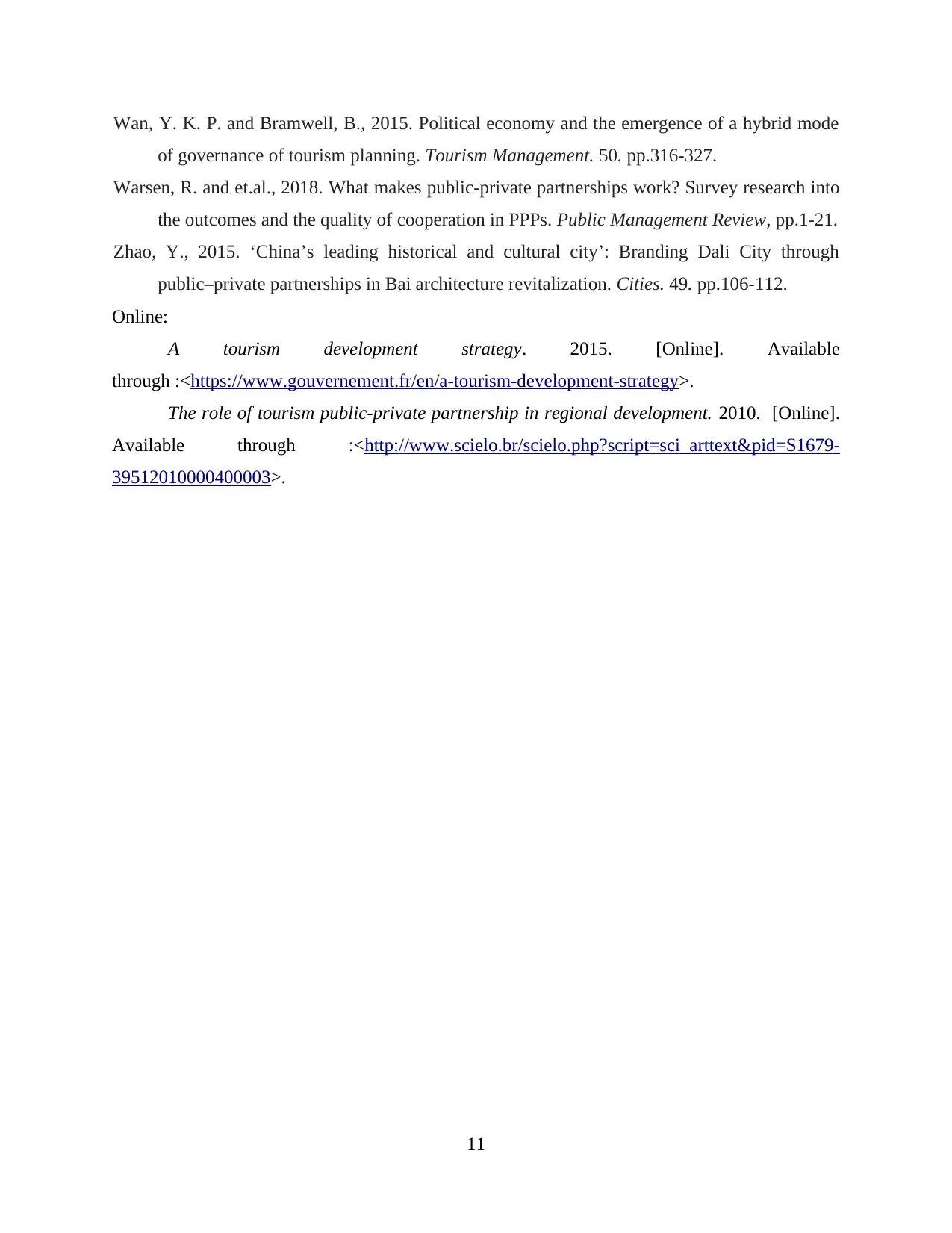
Wan, Y. K. P. and Bramwell, B., 2015. Political economy and the emergence of a hybrid mode
of governance of tourism planning. Tourism Management. 50. pp.316-327.
Warsen, R. and et.al., 2018. What makes public-private partnerships work? Survey research into
the outcomes and the quality of cooperation in PPPs. Public Management Review, pp.1-21.
Zhao, Y., 2015. ‘China’s leading historical and cultural city’: Branding Dali City through
public–private partnerships in Bai architecture revitalization. Cities. 49. pp.106-112.
Online:
A tourism development strategy. 2015. [Online]. Available
through :<https://www.gouvernement.fr/en/a-tourism-development-strategy>.
The role of tourism public-private partnership in regional development. 2010. [Online].
Available through :<http://www.scielo.br/scielo.php?script=sci_arttext&pid=S1679-
39512010000400003>.
11
of governance of tourism planning. Tourism Management. 50. pp.316-327.
Warsen, R. and et.al., 2018. What makes public-private partnerships work? Survey research into
the outcomes and the quality of cooperation in PPPs. Public Management Review, pp.1-21.
Zhao, Y., 2015. ‘China’s leading historical and cultural city’: Branding Dali City through
public–private partnerships in Bai architecture revitalization. Cities. 49. pp.106-112.
Online:
A tourism development strategy. 2015. [Online]. Available
through :<https://www.gouvernement.fr/en/a-tourism-development-strategy>.
The role of tourism public-private partnership in regional development. 2010. [Online].
Available through :<http://www.scielo.br/scielo.php?script=sci_arttext&pid=S1679-
39512010000400003>.
11
1 out of 14
Related Documents
Your All-in-One AI-Powered Toolkit for Academic Success.
+13062052269
info@desklib.com
Available 24*7 on WhatsApp / Email
![[object Object]](/_next/static/media/star-bottom.7253800d.svg)
Unlock your academic potential
© 2024 | Zucol Services PVT LTD | All rights reserved.





